Testing: pytest-cov¶
pytest-cov is a pytest plugin that produces coverage reports. Compared to just using
coverage run this plugin has some extra features:
Subprocess support: you can fork or run stuff in a subprocess and will get covered without any fuss.
Consistent pytest behavior. If you run
coverage run -m pytestyou will have slightly differentsys.path(CWD will be in it, unlike when runningpytest).
All features offered by the coverage package should work, either through pytest-cov’s command-line options or through coverage’s config file.
For more information visit https://pytest-cov.readthedocs.io/en/latest/readme.html
Installation¶
$ poetry add pytest-cov --dev
Usage¶
$ pytest --cov
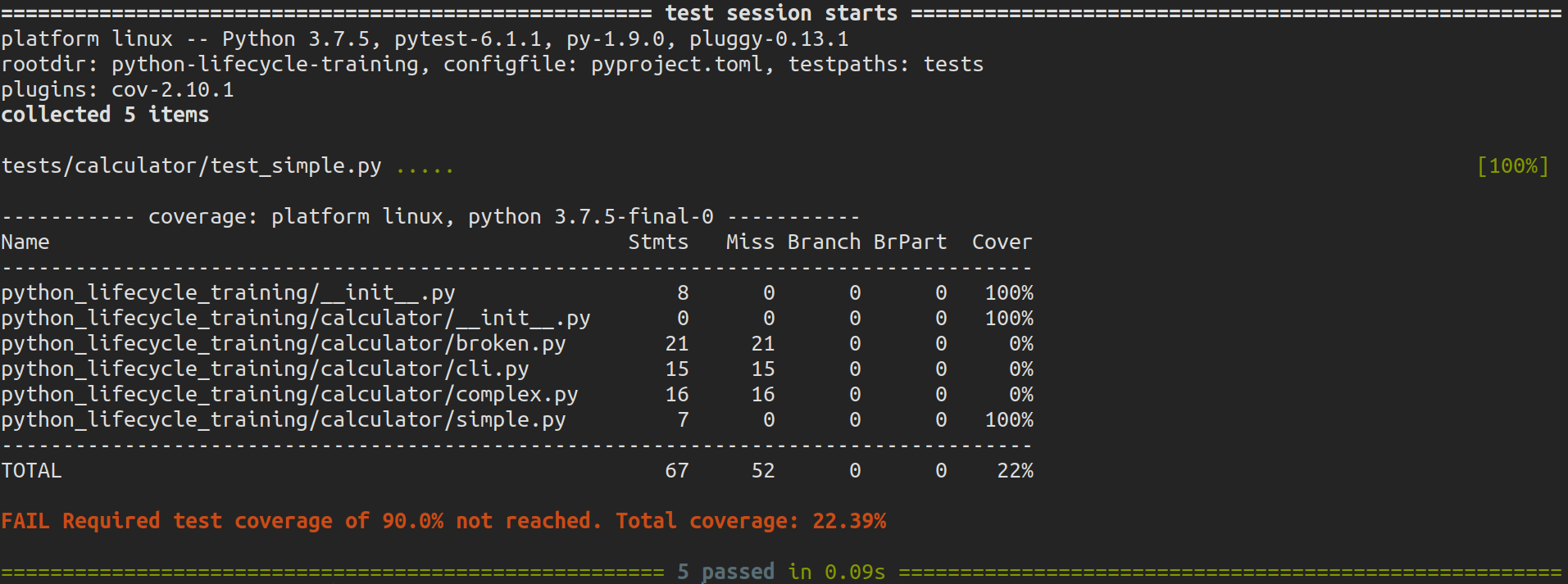
Terminal report with missing line numbers:
$ pytest --cov --cov-report=term-missing
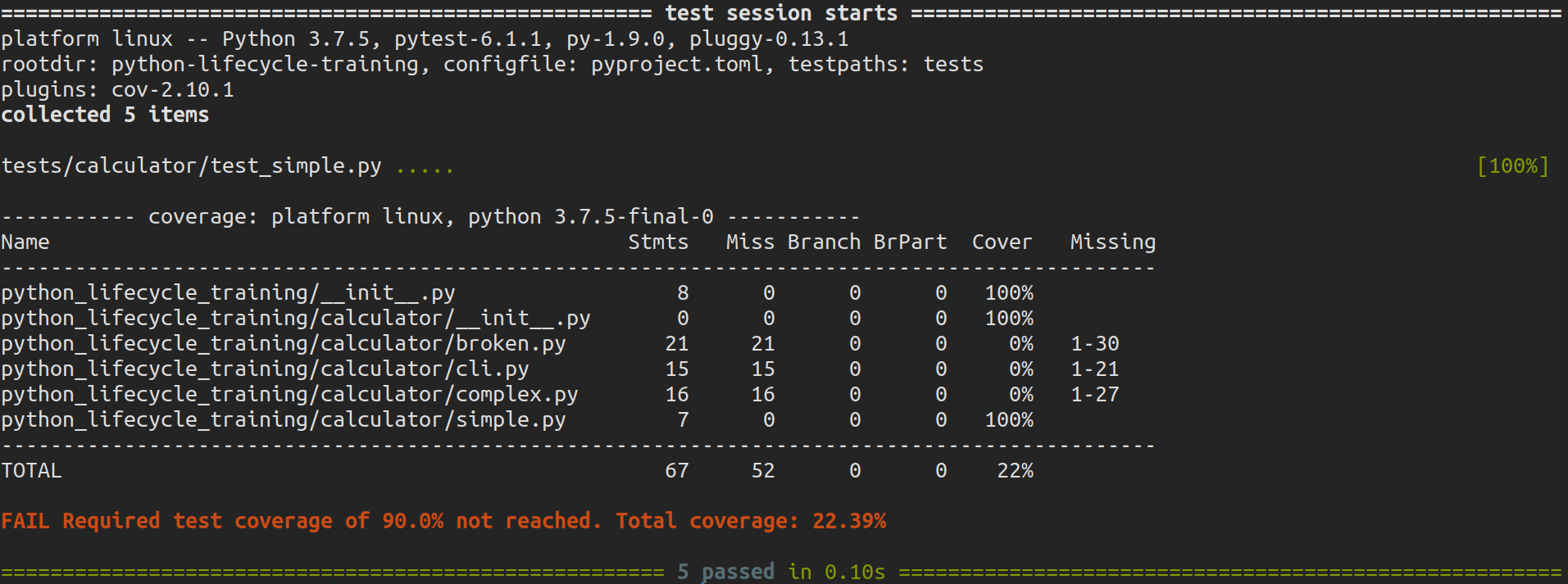
Terminal report with skip covered:
$ pytest --cov --cov-report=term-missing:skip-covered
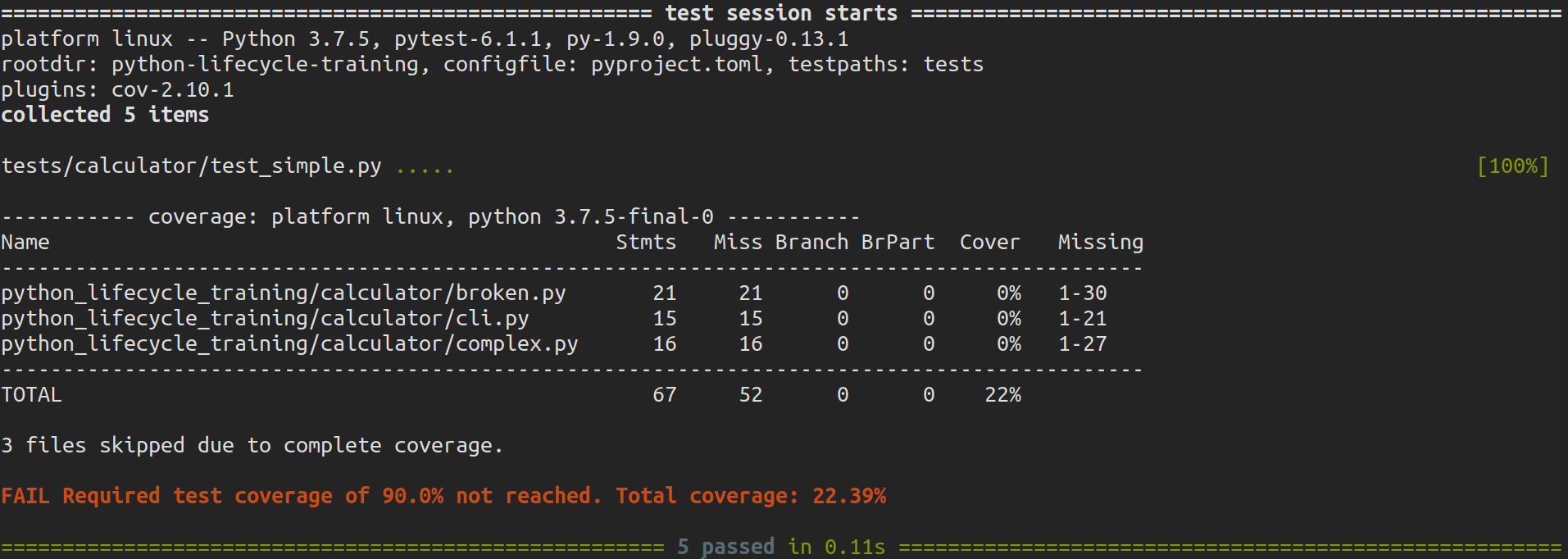
HTML report:
$ pytest --cov --cov-report=html
$ chromium htmlcov/index.html

Note
You can replace pytest and coverage with pytest-cov in your dev-dependencies
Configuration¶
Update the pytest configuration in pyproject.toml so that pytest-cov always
runs when you run pytest.
[tool.pytest.ini_options]
testpaths = "tests"
addopts = "--cov --cov-report=term-missing"
Tests¶
We can see that we failed to acquire the required test coverage. Let us write some more
tests. Create test_complex.py to start writing tests for the complex calculator.
import pytest
from python_lifecycle_training.calculator.complex import Calculator
class TestCalculator:
@staticmethod
def test_add():
assert Calculator.add(1, 2) == 3
@staticmethod
def test_sub():
assert Calculator.sub(2, 1) == 1
@staticmethod
def test_mul():
assert Calculator.mul(1, 2) == 2
@staticmethod
def test_div():
assert Calculator.div(2, 1) == pytest.approx(2)
Run tests
$ pytest

Exceptions¶
To write assertions about raised exceptions, you need to use pytest.raises as a
context manager.
@staticmethod
def test_div_by_zero():
with pytest.raises(ZeroDivisionError) as excinfo:
assert Calculator.div(a, b) is None
assert str(excinfo.value) == "division by zero"
Run tests
$ pytest
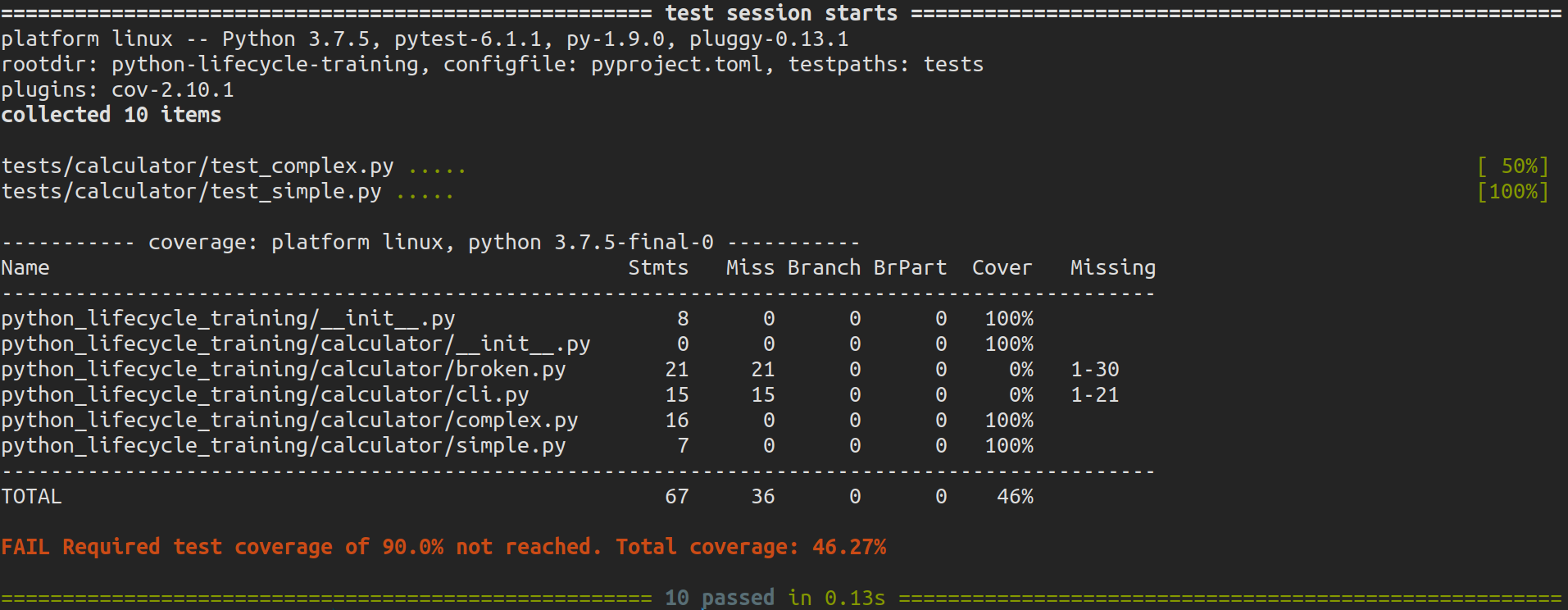
Warnings¶
Exception handling is quite important as we don’t want them showing up in our production server. Let’s write a warning when we encounter this problem.
import warnings
import fire
from loguru import logger
import python_lifecycle_training
class Calculator:
...
@staticmethod
def div(a, b):
logger.info(f"Dividing {a} by {b}")
if python_lifecycle_training.ENV == "production":
try:
return a / b
except ZeroDivisionError as e:
warnings.warn(str(e), RuntimeWarning)
return 0
else:
return a / b
You can check that code raises a particular warning using pytest.warns, which works
similar to raises.
import python_lifecycle_training
def test_div_by_zero():
python_lifecycle_training.ENV = "development"
with pytest.raises(ZeroDivisionError) as excinfo:
assert Calculator.div(a, b) is None
assert str(excinfo.value) == "division by zero"
python_lifecycle_training.ENV = "production"
with pytest.warns(RuntimeWarning) as record:
assert Calculator.div(a, b) == 0
assert str(record[0].message) == "division by zero"
Run tests
$ pytest
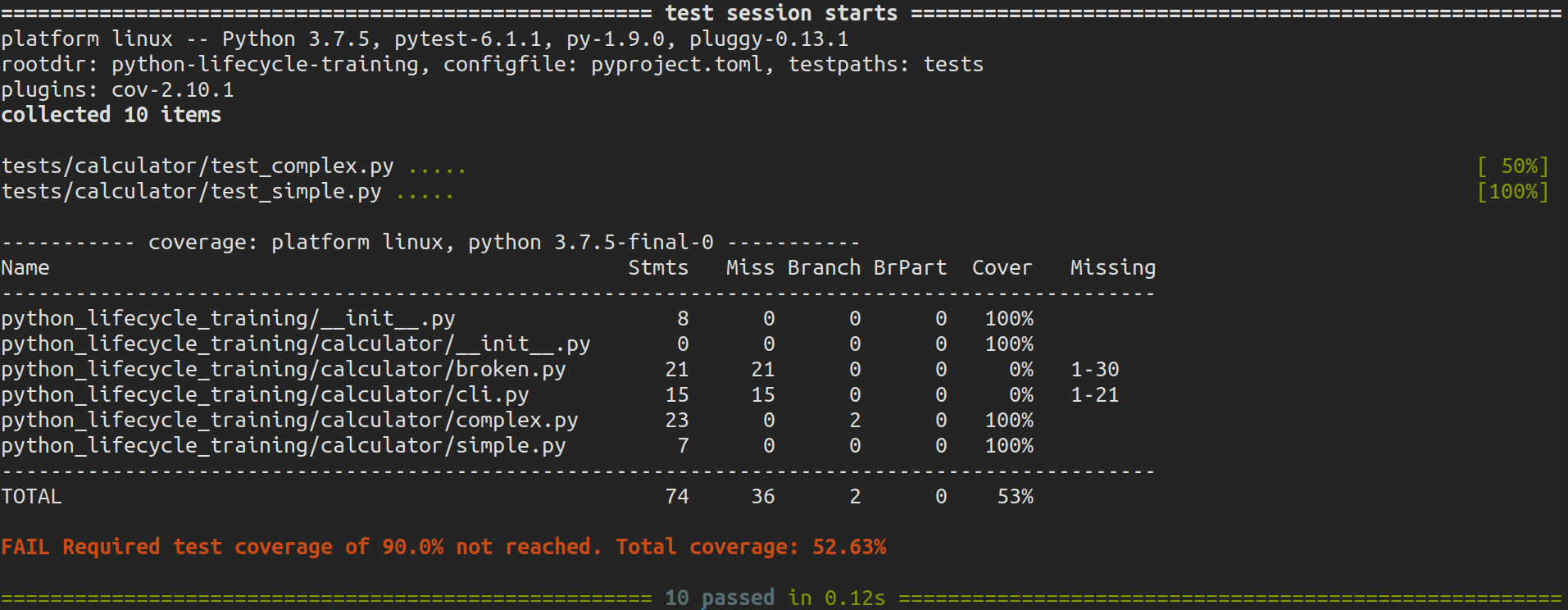
Logs¶
Pytest cannot capture logs from loguru directly. So we need to propagate our logs to the built-in Python logging to test log messages using pytest.
Add the propagation handler in the project __init__.py file.
import logging
class PropagateHandler(logging.Handler):
def emit(self, record):
logging.getLogger(record.name).handle(record)
logger.add(PropagateHandler(), format="{message}")
In case you don’t remember, we had written a code that logs our working environment when we make an instance of the CLI Main class of the calculator. Let us try writing log tests for it.
# tests/calculator/test_cli.py
import python_lifecycle_training
from python_lifecycle_training.calculator.cli import Main
class TestCalculatorCLI:
@staticmethod
def test_log(caplog):
env = "production"
python_lifecycle_training.ENV = env
Main(env=env)
assert env in caplog.text
Run tests
$ pytest
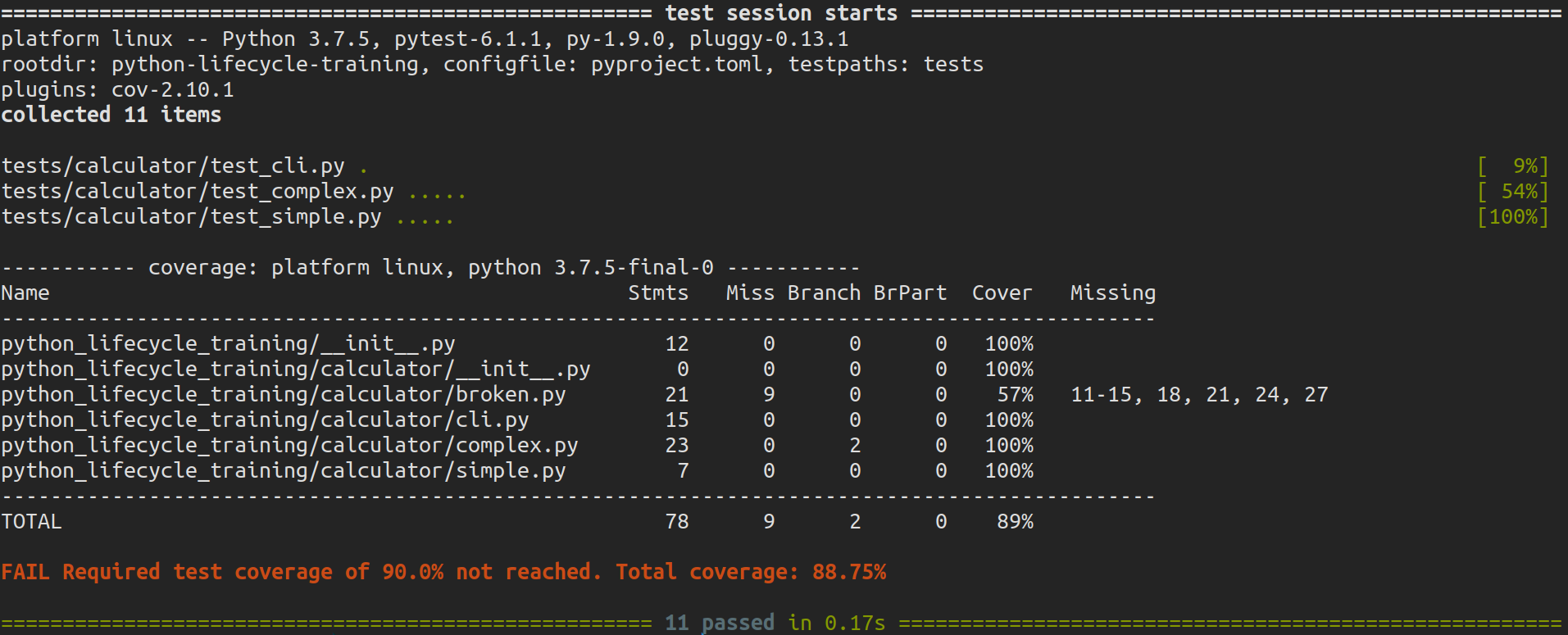
Next Step¶
Write tests for the broken calculator
Write parameterized test for the method
test_divWrite parameterized test to test log for both “development” and “production” environments
To move on to the next step commit or stash your changes then checkout to the branch
setup/test/tox
$ git stash
$ git checkout setup/test/tox
Uninstall¶
$ poetry remove pytest-cov --dev